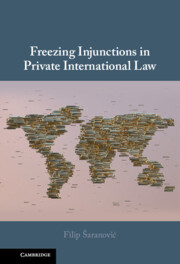Book contents
- Freezing Injunctions in Private International Law
- Freezing Injunctions in Private International Law
- Copyright page
- Contents
- Acknowledgements
- 1 Introduction
- 2 Historical Foundations of Freezing Injunctions
- 3 Theoretical Foundations of Freezing Injunctions
- 4 Theoretical Foundations of Jurisdiction in Private International Law
- 5 Application of Jurisdictional Theories
- 6 Reform Proposals
- 7 The Relationship between Freezing Injunctions and Other Interim Relief
- 8 Conclusions
- Index
2 - Historical Foundations of Freezing Injunctions
Published online by Cambridge University Press: 20 October 2022
- Freezing Injunctions in Private International Law
- Freezing Injunctions in Private International Law
- Copyright page
- Contents
- Acknowledgements
- 1 Introduction
- 2 Historical Foundations of Freezing Injunctions
- 3 Theoretical Foundations of Freezing Injunctions
- 4 Theoretical Foundations of Jurisdiction in Private International Law
- 5 Application of Jurisdictional Theories
- 6 Reform Proposals
- 7 The Relationship between Freezing Injunctions and Other Interim Relief
- 8 Conclusions
- Index
Summary
This chapter critically analyses the origins of the modern freezing injunction. The analysis is not limited to the landmark cases in 1975, Karageorgis and Mareva, covered in detail in this chapter. It argues that an important part of the historical foundations of freezing injunctions is the original exception to the general rule: the proprietary freezing injunction. Understanding the nature of the proprietary freezing injunction is crucial in order to assess the legitimacy of extending the scope of the exception to non-proprietary claims in 1975. The chapter recognises that there is now an important new category of freezing injunction, the so-called Chabra injunction against third parties. A detailed analysis of the scope of Chabra injunctions reveals serious concerns about a level playing field in litigation.
Keywords
- Type
- Chapter
- Information
- Freezing Injunctions in Private International Law , pp. 14 - 62Publisher: Cambridge University PressPrint publication year: 2022

